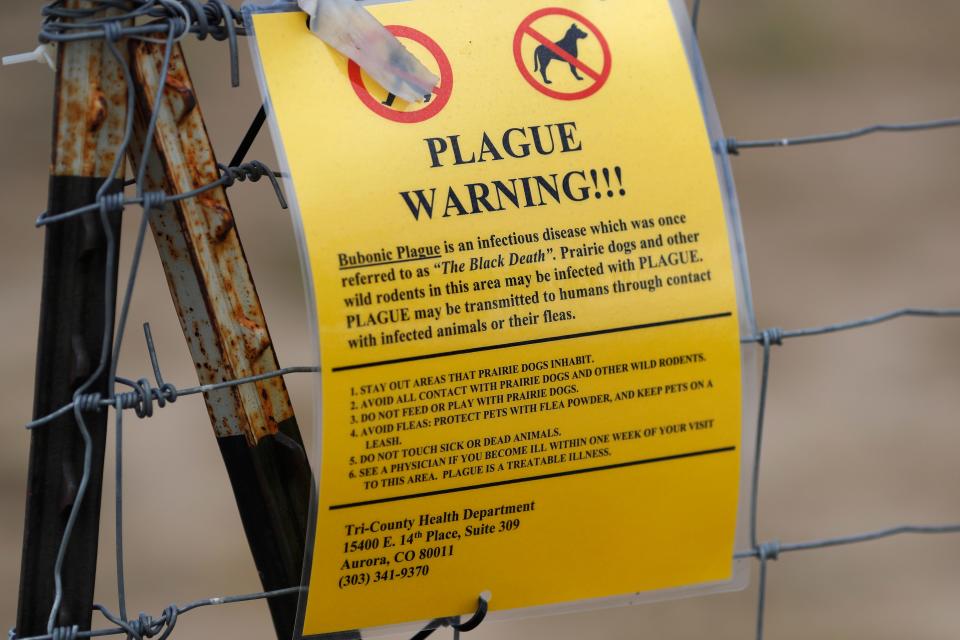A person in Oregon caught bubonic plague from their cat. Why experts say not to worry.
A confirmed case of human bubonic plague in Oregon raised fears over a resurgence of the infamous contagion that wiped out millions in the Middle Ages. But officials say there's no cause for alarm.
Authorities confirmed on Feb. 7 that the infected person caught the plague from their house cat. Officials in Deschutes County, a county in Central Oregon where the person lives, contacted and provided medicine to all close contacts of the person and their cat.
The infected person was diagnosed and treated early on, "posing little risk to the community," the agency said.

More: Alaska man’s death marks first fatal case of Alaskapox: What to know about the rare virus
Experts say little cause for concern about bubonic plague today
The plague wiped out at least a third of Europe's population in the Middle Ages, but officials said there is no cause for concern today.
Not at all, said Dr. Robert Bollinger, the Raj and Kamla Gupta Professor of Infectious Diseases at Johns Hopkins University's Bloomberg School of Public Health.
"It's not unusual to have an isolated case of bubonic plague," Bollinger told USA TODAY. "It's serious when it happens, but it's treatable if you catch it early enough."
The Oregon case is consistent with a handful of cases that pop up annually in the country, "usually somewhere between five and 10 cases a year reported in the United States," Bollinger said. "That's been pretty consistent for many, many decades."
Bubonic plague is one of three ways that the bacteria, known as Yersinia pestis to scientists, can cause disease in humans, Bollinger said. The bubonic form, the most common, causes swollen glands.
Another more serious form of the disease triggers severe pneumonia. "That's been associated with the big breaks that happened historically," Bollinger said. Pneumonic plague can be transmitted directly between humans coughing, but it's less contagious than COVID-19 or influenza.
In the last form, septicemic, plague bacteria enter the bloodstream.
Bubonic plague not directly transmissible between humans
Bubonic plague isn't directly transmissible between humans. "It's transmitted through fleas or contacts from an infected animal to a human," Bollinger said.
That explains why bubonic plague devastated Europe in the 1300s, even though it poses little threat to humans now.
People in the Middle Ages lived "in very, very close quarters with each other and with rodents," Bollinger said, creating a more ideal environment for the plague to jump between the animals and humans.
"We had a lot more contact with rodents and fleas back in those days than we do now," Bollinger said.
Nowadays, unless someone is coming into unusually close contact with rodents, "it's not a big deal," Bollinger said.
"It's just part of the environment," he said. "It's part of the microbiome of some of these rodents."
'Very treatable'
Treatments for plague have also vastly improved. "We have really good treatments, if we get them to people earlier, that weren't available back in the day," Bollinger said. "There's lots of antibiotics that work really well. If you start early enough, it's very treatable."
With proper treatment, a bubonic plague infection could clear up "over a period of weeks," Bollinger said.
Authorities in Deschutes said the recent case is the first in the state since 2015. Deschutes officials said squirrels and chipmunks are the most likely carriers of the disease in central Oregon, but mice and rodents can also be infected, according to the announcement.
Bollinger said 80% of cases in the U.S. occur in the Four Corners area – New Mexico, Utah, Colorado, and Arizona – due to the area's concentration of rodent populations.
Deschutes County Health Services said people can prevent the plague's spread by discouraging house cats from hunting rodents and not touching dead rodents. They also warned against feeding squirrels, chipmunks, and rodents and advised wearing long pants tucked in to boots to avoid fleas.
Cybele Mayes-Osterman is a breaking news reporter for USA Today. Reach her on email at [email protected]. Follow her on X @CybeleMO.
This article originally appeared on USA TODAY: Bubonic plague human case confirmed. Why experts say not to worry.
